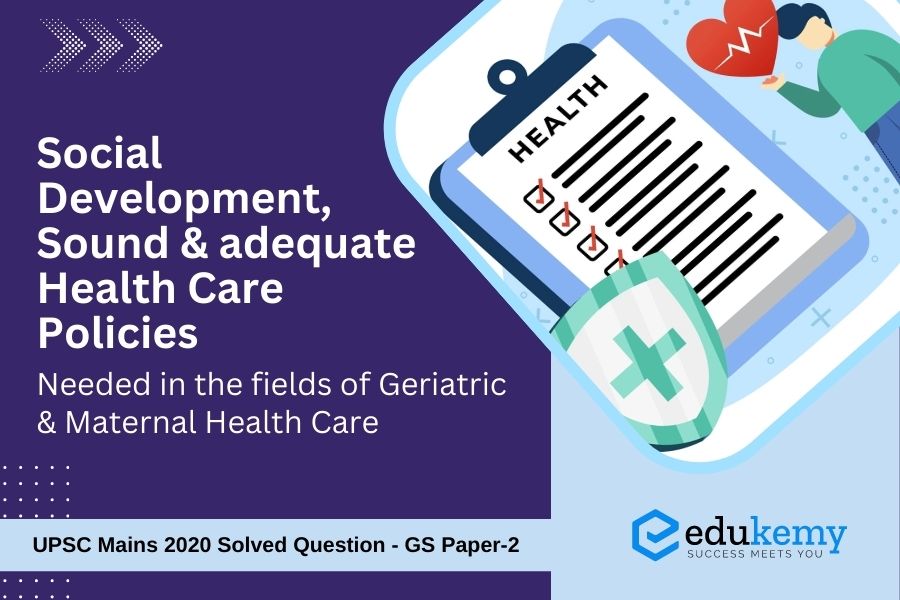In the pursuit of advancing social development, the formulation and implementation of robust health care policies are imperative, particularly in the realms of geriatric and maternal healthcare. Recognizing the unique needs and vulnerabilities of these demographic groups is crucial for fostering a society that values the well-being of all its members. Adequate health care policies tailored to address the challenges faced by the elderly and expectant mothers not only contribute to the overall health and quality of life of individuals but also serve as a foundation for a more compassionate and inclusive society. By prioritizing comprehensive geriatric care that addresses the physical, mental, and emotional aspects of aging, and by ensuring accessible and high-quality maternal health services, societies can create environments that support the diverse needs of their populations. In doing so, we not only promote individual health but also lay the groundwork for a socially developed and equitable future.
UPSC Mains General Studies Paper – 2 Mains 2020
Issues relating to development and management of Social Sector/Services relating to Health, Education, Human Resources
UPSC Mains Civil Services IAS Exam Question Paper – 2020
Contents
- 1 Structure of the Question
- 2 Answer
- 3 Conclusion
- 4 Frequently Asked Questions (FAQs)
- 4.1 1. Why is there a need for specific healthcare policies in the fields of geriatric and maternal healthcare to enhance social development?
- 4.2 2. How do targeted healthcare policies in geriatric and maternal health positively impact social development?
- 4.3 3. What role do geriatric and maternal health care policies play in reducing health disparities within a society?
- 4.4 4. How can healthcare policies tailored to geriatric and maternal health contribute to economic growth and stability?
- 4.5 5. What are the key components that should be included in geriatric and maternal health care policies to maximize their impact on social development?
- 5 In case you still have your doubts, contact us on 9811333901.
Structure of the Question
- In Introduction,
- About social development, and the present healthcare situation in the country.
- In Body,
- Relationship between healthcare and social development.
- Geriatric Healthcare.
- Maternal Healthcare.
- In Conclusion, the importance of healthcare for the holistic growth of the nation.
Answer
Introduction
Social development reflects the improved well-being of every individual in society. Poor health constitutes suffering and deprivation of the most fundamental kind. Diseases impact well-being, burden families, weaken societies, and squander potential. Over the years, significant strides have been made in increasing life expectancy and reducing some of the common killers associated with child and maternal mortality.
Poverty
In developing countries, breaking the vicious circle of poverty and ill health is an essential condition for development.
Economic growth
Health is pertinent for the realization of basic human needs and for a better quality of life. Health is a causative factor that affects a country’s aggregate level of economic growth.
Out-of-pocket expenditures
The rising out-of-pocket expenditures on healthcare push around 32-39 million Indians below the poverty line annually.
Vulnerable sections
Women and the elderly are one of the most vulnerable sections of society. In this context, access to quality health care and sound health policies are crucial for their healthy development, reduction of deprivation, and social empowerment.
Health induced poverty
This is a common norm due to the high cost of health care which makes it difficult to address other social requirements like education. The increasing expenditure on healthcare pushes around 32 to 39 million Indians below the poverty line on an annual basis.
Enhanced Human Capacity
Health care has the potential to enhance human capabilities and can aid in economic development which will result in further contribution towards the growth of the nation.
Geriatric Healthcare
The National Elderly Policy defines people of the 60+ age group as elderly. Marking of the UN ‘Decade of Healthy Ageing (2020-2030)’ highlights the significance of elderly population challenges.
Phased-in Retirement
Phased-in retirement suggests a scheme whereby older workers could choose to work fewer hours yet remain longer in the labor force. This would ensure continuity in tax revenues and reduced expenditure on pensions.
Robust Healthcare Infrastructure
Good quality healthcare infrastructure is of utmost importance to the elderly in an age-sensitive manner.
Strengthen the Family Care System
The preferred source of support for the aged is still the family. The reciprocal care and support within the multi-generational families of parents, grandparents, and children should be encouraged by way of school curricula and through the media.
Promoting and rewarding volunteering
Governments could make provisions to promote and reward volunteering and care work among citizens and NGOs.
Other initiatives of the Government of India
- Integrated Programme for Older Persons (IPOP)
- Rashtriya Vayoshri Yojana (RVY)
- Indira Gandhi National Old Age Pension Scheme (IGNOAPS)
- Varishtha Pension Bima Yojana (VPBY)
Maternal Healthcare
- Women are strong pillars of any society. Sustainable development in India can only happen through maternal and child care.
- Maternal health is an important aspect of development in terms of increasing equity and reducing poverty.
- The survival and well-being of mothers are not only important in their own right but are also central to solving larger economic, social, and developmental challenges.
- The Sustainable Development Goal 3 pertains to maternal health, where the target is to reduce maternal mortality ratio (MMR) to 70 per 100000 live births.
- Institutional deliveries are an important means to achieve maternal health. Key initiatives in this are:
- Janani Suraksha Yojana
- Janani Shishu Suraksha Karyakram
- Midwifery initiative aims to create a cadre of skilled nurses to provide compassionate women-centered, reproductive, maternal, and newborn healthcare.
Policy lacunas that need to be addressed
- Policy formulation lacks backing of credible data which reduces the quality of policies.
- Lack of convergence of policies and coordination between centers and states for implementation of policies.
- There is leakage in the implementation system, low allocation of resources for social security, and under-utilization of funds by implementing agencies.
- A high proportion of indirect taxes in the economy affect weaker sections disproportionately.
- Populist measures undermining economically sound policies. Lack of long-term vision, where policies mimic electoral needs.
Conclusion
Healthcare has a major role to play in reducing social exclusion at the local level, due to its impact on employment, working conditions, and household income. It can drive forward the implementation of local and national goals for sustainable development. This can potentially help in realizing the goal of a $5 trillion economy even faster and also aid in the sustainable development of the country.
Frequently Asked Questions (FAQs)
A: Geriatric and maternal health are crucial aspects of societal well-being. Tailored policies address the unique needs of these demographics, promoting healthier aging and ensuring safe childbirth experiences, contributing to overall social development.
A: Specialized policies address the distinct challenges faced by elderly and pregnant individuals, fostering better health outcomes. By ensuring accessibility, affordability, and quality care, these policies contribute to a healthier and more productive society, ultimately promoting social development.
3. What role do geriatric and maternal health care policies play in reducing health disparities within a society?
A: Comprehensive policies aim to bridge gaps in healthcare access, especially for vulnerable populations such as the elderly and pregnant women. This inclusivity helps diminish disparities, fostering a more equitable and socially developed community.
4. How can healthcare policies tailored to geriatric and maternal health contribute to economic growth and stability?
A: Healthy aging and safe childbirth positively impact workforce productivity. Adequate healthcare policies ensure that individuals can maintain their well-being, reducing the economic burden associated with illness. This, in turn, contributes to sustained economic growth and stability.
A: Effective policies should encompass preventive care, access to specialized services, caregiver support, and education. By addressing the holistic needs of the elderly and pregnant women, these policies create a foundation for enhanced social development and improved overall community well-being.
In case you still have your doubts, contact us on 9811333901.
For UPSC Prelims Resources, Click here
For Daily Updates and Study Material:
Join our Telegram Channel – Edukemy for IAS
- 1. Learn through Videos – here
- 2. Be Exam Ready by Practicing Daily MCQs – here
- 3. Daily Newsletter – Get all your Current Affairs Covered – here
- 4. Mains Answer Writing Practice – here



